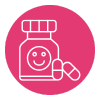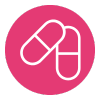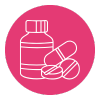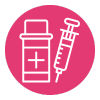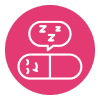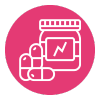
Written by:

Medically Reviewed by:
Last Updated:
February 3rd, 2025
Prescription drug addiction
Prescription drugs are an effective tool in modern medicine, helping to relieve pain, aid sleep and improve mental health conditions. While this all sounds great on the surface, there is a darker side to prescription drugs. They can also be highly addictive, with their abuse leading to physical and psychological dependence. Prescription drug addiction has become a significant problem in the UK and with devastating consequences.
If you are concerned about prescription drug addiction and would like help or advice, Banbury Lodge is here to support you.
What are prescription drugs?
Prescription drugs are medications prescribed by a doctor to treat specific medical conditions. There are many different types of prescription drugs, but some of the most commonly abused are amphetamines, opiates and benzodiazepines.
Antidepressant addiction
Antidepressant addiction occurs when individuals develop a dependency on prescription medications, often used to treat depression or anxiety. Overuse or misuse can lead to withdrawal symptoms, emotional instability, and a reliance on the medication despite potential risks.
Amphetamine
addiction
Amphetamine addiction involves the compulsive use of stimulant drugs, often for their energizing or euphoric effects. This addiction can lead to physical and mental health issues, including heart problems, insomnia, anxiety, and long-term cognitive impairments.
Pregabalin
addiction
Pregabalin addiction develops when individuals misuse the medication, often prescribed for nerve pain or anxiety. Misuse can lead to tolerance, dependency, and withdrawal symptoms, causing significant disruptions to mental and physical health. Click to learn more.
Benzodiazepine
addiction
Benzodiazepine addiction stems from prolonged or misuse of these sedative medications, commonly prescribed for anxiety, insomnia, or seizures. Overuse can lead to physical and psychological dependence, memory problems, and an increased risk of overdose.
Opioid
addiction
Opiate addiction arises from the misuse of prescription painkillers or illicit drugs like heroin. This addiction is characterized by intense cravings, physical dependency, and severe withdrawal symptoms, often leading to long-term health issues and a higher risk of overdose. Click to learn more.
Sleeping pills
addiction
Sleeping pills addiction involves the misuse of sedative medications used to treat insomnia. Overuse can result in dependency, disrupting natural sleep patterns, leading to withdrawal symptoms, cognitive impairments, and a heightened risk of overdose. Click to learn more.
Stimulant
addiction
Stimulant addiction is characterized by the repeated misuse of drugs such as cocaine, methamphetamine, or prescription stimulants. This addiction leads to psychological dependency, physical health problems, and long-term effects on mental and emotional well-being.
How does prescription drug addiction develop?
There are two distinct paths to prescription drug addiction: being prescribed medication by your doctor and recreational use.
Prescribed by a doctor
For many, prescription drug addiction develops after they are prescribed medication for a legitimate medical need. You may have a chronic pain condition, anxiety or insomnia, and at first, the prescription drug may be highly effective at managing these symptoms.
However, over time, the brain will become tolerant to the drug, which means that you will need a higher dose to achieve the same effect. This can lead to dependence, where you need the prescription drug just to feel normal.
Prescription drug addiction quickly follows once dependence has set in. You may experience intense cravings for the drug and feel a compulsive need to use, even if it is causing harm.
Recreational use
Prescription drug addiction can also develop through recreational use. This is when you take prescription drugs with the aim of getting high, to enhance the effects of other substances or as a way to manage a comedown.
Recreational use of prescription drugs can be particularly dangerous because you may not be aware of the side effects associated with the drug or the correct dosage. It is also likely that prescription drugs will be taken alongside other substances, such as illicit drugs or alcohol, which can prove to be dangerous, and even lethal in some cases.
It is vital to understand that prescription drugs are not inherently safer than illicit drugs, and abusing them can result in serious harm and addiction.
Who is at risk of prescription drug addiction?
The scary thing about this addiction is that it can impact anyone, at any time in their life. Taking these drugs in any capacity could potentially lead to dependency, however, there are several risk factors that can increase your likelihood of developing a prescription drug addiction.
These risk factors include:
- History of substance abuse: If you have a history of substance abuse, you may be more likely to develop prescription drug addiction.
- Suffering from mental health disorders: You are more likely to develop prescription drug addiction if you suffer from mental health issues as you could use the drugs to self-medicate.
- Suffering from chronic pain: If you have chronic pain, you may be more likely to develop prescription drug addiction as you become dependent on the drugs to manage your pain.
- Using medication outside of the ways it is prescribed: Taking prescription drugs more frequently, in higher doses or for longer than prescribed can heavily increase your risk of addiction.
- Adolescents and young adults: You are more susceptible to the effects of prescription drugs at a young age, and are therefore more likely to develop an addiction.
- Family history of addiction: If you have close family members with substance abuse disorder you may also be at risk due to both genetic and environmental factors.
- History of trauma: If you have experienced trauma, such as abuse or neglect, you may be more likely to develop prescription drug addiction as you may use the drugs to cope with your emotions.
Understanding these risk factors and taking action to prevent prescription drug addiction is important. If you fall into one of the above categories, it is a good idea to talk to your healthcare provider before obtaining a prescription.
Side effects of prescription drugs
Prescription drugs can have a range of side effects depending on the type of drug and how it is used. Some of the most common side effects of prescription drugs include:
- Drowsiness
- Nausea
- Headaches
- Constipation
- Dizziness
- Slurred speech
- Respiratory depression
- Liver and kidney damage
- Heart problems
As well as these physical side effects, prescription drugs can also impact your psychological health. Some of the most common psychological side effects include:
- Problems with memory
- Difficulty concentrating
- Confusion
- Mood swings and irritability
- Depression
- Anxiety
- Paranoia
If you have experienced any of these side effects, don’t delay. Reach out to Banbury Lodge and get the help you need to overcome your prescription drug addiction.
Spotting prescription drug addiction in a loved one
Spotting a prescription drug addiction is difficult – anyone can take medications for a legitimate medical reason and it is therefore very easy to hide when there’s a problem. Some signs to watch for in friends or family members include:
- Constant complaints about being unable to renew a prescription
- Attending multiple doctor’s appointments to try and get a prescription
- Buying prescription drugs online or on the street
- Neglecting day-to-day responsibilities
- Changes to behaviour, for example, becoming more isolated, easily agitated, appearing “out of it”
- Changes to sleep patterns
- Experiencing financial difficulties as they try to maintain their prescription drug habit
If you have noticed any of these signs and are worried about a loved one’s prescription drug use, it is important to approach them with compassion and concern. Avoid passing judgments or engaging in confrontation. Instead, you should offer your support and let your family member know you will be there to help them through recovery when they are ready.
Prescription drug addiction: truths and lies
Prescription drug addiction can be a challenging and complex issue to deal with, and it can be difficult to separate the truth from the lies. Addiction can convince you that you need prescription drugs to function, that you will experience pain without them and that they are safe because they are legal.
Unfortunately, the truth is that prescription drugs can damage every area of your life if dependency takes hold. Prescription drug addiction can destroy relationships, impact your career, deplete finances and harm your physical and mental health.
Can I get help for prescription drug addiction?
Recovery from prescription drug addiction is entirely possible with the right treatment plan. Banbury Lodge offers safe and effective prescription drug detox alongside proven therapy techniques that are delivered in individual and group settings. With the assistance of our experienced team, you will be able to address the reasons for your prescription drug addiction, learn how to manage your cravings and prevent relapse.
Prescription drug rehab is a challenging but rewarding experience that will set you up for long-term success. If you are ready and willing to make positive changes in your life, contact our admissions team today.


